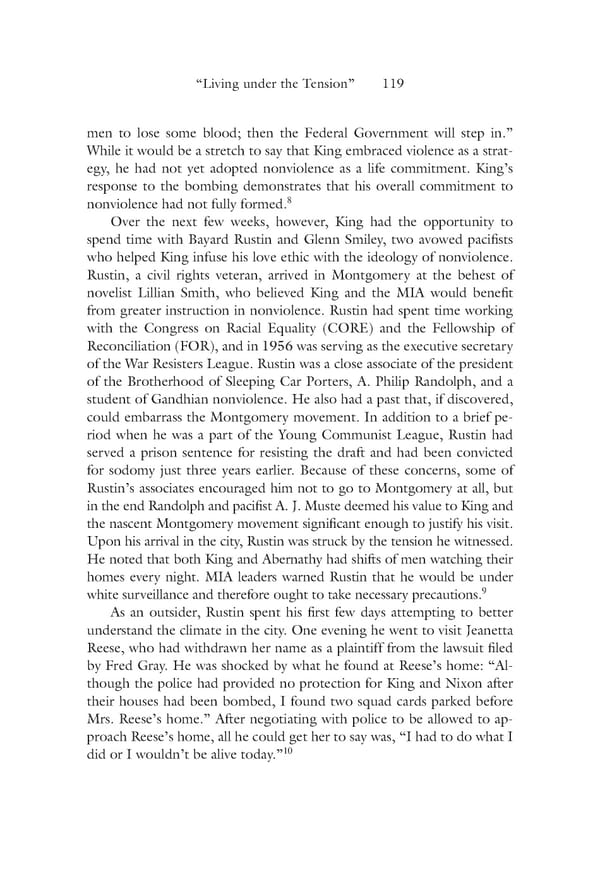“Living under the Tension” 119 men to lose some blood; then the Federal Government will step in.” While it would be a stretch to say that King embraced violence as a strat- egy, he had not yet adopted nonviolence as a life commitment. King’s response to the bombing demonstrates that his overall commitment to 8 nonviolence had not fully formed. Over the next few weeks, however, King had the opportunity to spend time with Bayard Rustin and Glenn Smiley, two avowed pacifists who helped King infuse his love ethic with the ideology of nonviolence. Rustin, a civil rights veteran, arrived in Montgomery at the behest of novelist Lillian Smith, who believed King and the MIA would benefit from greater instruction in nonviolence. Rustin had spent time working with the Congress on Racial Equality (CORE) and the Fellowship of Reconciliation (FOR), and in 1956 was serving as the executive secretary of the War Resisters League. Rustin was a close associate of the president of the Brotherhood of Sleeping Car Porters, A. Philip Randolph, and a student of Gandhian nonviolence. He also had a past that, if discovered, could embarrass the Montgomery movement. In addition to a brief pe- riod when he was a part of the Young Communist League, Rustin had served a prison sentence for resisting the draft and had been convicted for sodomy just three years earlier. Because of these concerns, some of Rustin’s associates encouraged him not to go to Montgomery at all, but in the end Randolph and pacifist A. J. Muste deemed his value to King and the nascent Montgomery movement significant enough to justify his visit. Upon his arrival in the city, Rustin was struck by the tension he witnessed. He noted that both King and Abernathy had shifts of men watching their homes every night. MIA leaders warned Rustin that he would be under 9 white surveillance and therefore ought to take necessary precautions. As an outsider, Rustin spent his first few days attempting to better understand the climate in the city. One evening he went to visit Jeanetta Reese, who had withdrawn her name as a plaintiff from the lawsuit filed by Fred Gray. He was shocked by what he found at Reese’s home: “Al- though the police had provided no protection for King and Nixon after their houses had been bombed, I found two squad cards parked before Mrs. Reese’s home.” After negotiating with police to be allowed to ap- proach Reese’s home, all he could get her to say was, “I had to do what I 10 did or I wouldn’t be alive today.”
 Becoming King: Martin Luther King Jr. Page 139 Page 141
Becoming King: Martin Luther King Jr. Page 139 Page 141